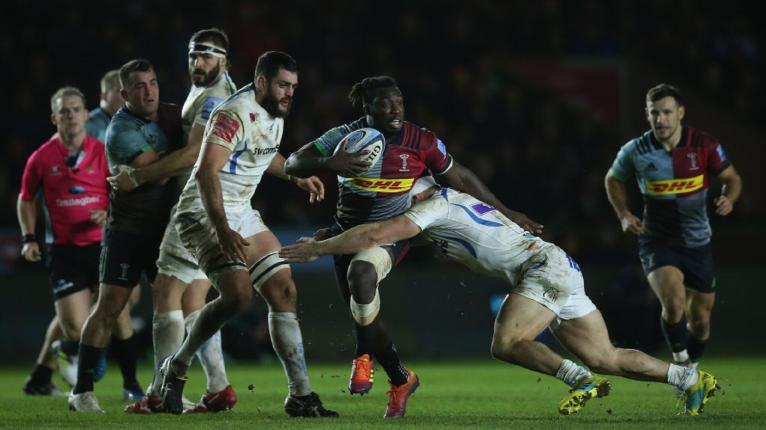Harlequins' new identity is beginning to emerge under Gustard

Not too many saw Harlequins’ 28-26 victory over Exeter Chiefs on Friday night coming.
Exeter had, before their visit to the Stoop, enjoyed a clean sweep of eight wins to start the domestic season and whilst not all of those games were emphatic, runaway victories, the side from the south-west had been mastering the art of securing narrow wins when playing well below their ability.
With a number of internationals, like Henry Slade and Ben Moon, rested, Santiago Cordero given the night off and the injured trio of Sam Simmonds, Jack Nowell and Jonny Hill all also missing, there was no denying it was an understrength side. That said, with players like Nic White, Don Armand and Matt Kvesic involved, it was still a group more than capable of getting a result, and the consensus pre-match seemed to be that that is what they would do. Go to the Stoop, pick up the four points and then welcome back some key players ahead of the European double header.
Quins were not in a generous mood, however, and, even with their fair share of missing players, such as Chris Robshaw, James Horwill and Tim Visser, turned the tables on Exeter and put down their greatest marker yet as to the kind of team they are developing into under new Head of Rugby Paul Gustard.

The London side have been in decline for a few seasons now and though there has been particular focus on the defensive and set-piece issues, their once-famed attack has also had its fair share of problems. Alongside Gustard, Alex Codling was brought in to help with the set-piece frailties, whilst Nick Evans was entrusted to turn around an attack that had lost its keen edge. On Friday night, there was a significant endorsement of all three.
Starting with the defence, offering up 26 points might not seem great on paper, especially with the concession of four tries, but it was an aggressive defensive performance that took risks and helped lay a foundation for the attack.
Ian Whitten’s last-minute intercept try was a loss of focus once the game had already been won. Not acceptable, but also forgivable and something which can be worked on, rather than a systemic issue in the club’s defence.
What was really impressive was the line-speed in the midfield and wide channels from Quins, who were frequently able to get up and shut down the width on offer to Exeter, forcing the play back inside. With the exception of Whitten’s intercept and one incisive counter-attack he launched, Exeter’s midfield was kept quiet throughout in regular phase play.

The set-piece chugged along nicely, with Quins securing the ball on all of their lineouts and scrums, usually comfortably, with the opportunity for quick ball off the top or from the base. A misfiring lineout has been one of, if not the club’s most prominent Achilles’ heel in recent seasons and efficiency of the unit on Friday night, if a sign of things to come, bodes very well for the side.
And finally, the attack.
Quins have always had a reputation for playing attractive, incisive, fast-flowing rugby, but that reputation has been running on fumes over the last couple of years, with the odd moment of magic reminding everyone what they are capable of, but also highlighting what they were not showing week in, week out in the Premiership and European competition.
On Friday, Quins were fizzing. They kept phases alive, offloading seven times more than Exeter did, in order to stretch defences and create space, which they then exploited with their bevvy of dangerous runners in their back line and back row. There was thought and skill in everything Quins were doing in attack and that allowed them to play a more open, threatening and, admittedly, risky style.
The eagerness to avoid contact, which can be as simple as running at the space just adjacent to a defender, rather than into the chest of a tackler, was helping them win collisions and once that battle was won, it was a much simpler process to free the hands and get the offloads away.
There are not many teams that can run Exeter about and impose an intensity on a game that the Devon-based side struggle to live with, but that’s just what happened at the Stoop.
There are plenty of work-ons from Quins, including a penalty count which again reached double figures and, most importantly, the consistency to replicate this performance for three or four games in a row, but the identity of what they are trying to become under Gustard certainly looks to be bedding in.
With players bigger, faster and fitter than ever before, space is the great premium in rugby, with the pitches not getting larger to account for these freakish athletes the game is now producing. If you have an attack that can stretch a defence and create space, and a defence that shuts down the space, then you are on a promising path for future success.
Watch: Francis Saili chats in the preseason about Quins’ 2017/18 campaign and his hopes for this season.







































